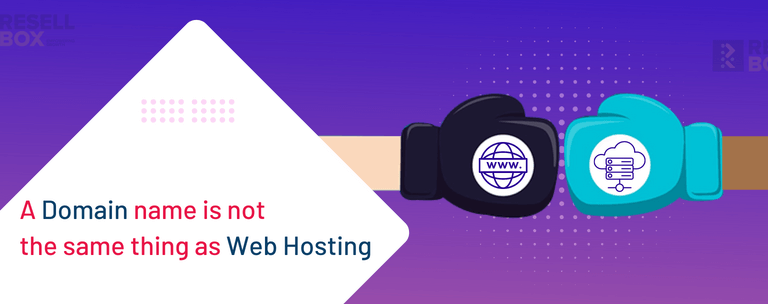
What Is The Difference Between Domain And Web Hosting?
Introduction
If you’re reading this, then you likely have your own site or blog. You’ve probably heard about domain registration and hosting, but you may have wondered: why is there such a difference between them? In this article we’ll explore what makes all these things different.
1. Domain Name Registration
A domain name is an address that can be used to access a website on the Internet. If someone types in “www dot com” into their web browser, they would be directed to your website’s home page—your domain name!
2. Web Hosting
Web hosting helps you manage your websites by providing storage space for your site’s files and services like email accounts and databases. The most common type of web host is shared server hosting (also known as VPS), where multiple users share resources across a single physical server instead of each having their own dedicated server space like with dedicated hosting.”What Is The Difference Between Domain And Web Hosting?””
Domain
A domain name is the web address you use to access a website. It’s made up of text, numbers and/or combinations of both.
Domain names must be registered with a registrar before they can be used to access websites. Registrars usually charge a fee for registering and renewing domains.
Web Hosting
Web hosting services are the backbone of your website. They allow people to view and interact with your website on the internet, regardless of where you live or who you are. Web hosts provide space on their servers (or computers) to store websites, which are then accessible via a URL address, like http://www.yourwebsitehere/.
Web hosting companies offer several different types of web hosting plans: shared plan, reseller plan and VPS (virtual private server) plan. Most people choose a shared plan as this provides adequate storage space for most applications but doesn’t allow for as much customization as other options do; however if you need more than what is provided by this type of service then it may be worth considering upgrading into another type such as reseller or VPS plans instead!
Business owners should understand the difference between domain and web hosting.
Domain names are registered names, like “www.example.com.” They can’t be changed once they’ve been purchased by the owner of a website (the domain name registrar). Web hosts provide services that allow you to publish your website online, such as transferring files from your computer to theirs or fastening up an email account so people can contact you directly without having to go through an ISP or other third party provider first; these additional features are included in most basic plans offered by web hosts.
Domain names are typically a part of your URL, but they aren’t the same as web hosting.
Domain names are typically a part of your URL, but they aren’t the same as web hosting. Domain names are the human readable part of a website’s address (e.g., www.mydomainname). They’re registered with a registrar and usually provide access to an online file storage system and other services like email, FTP (file transfer protocol) access, DNS management tools and more. When you purchase a domain name from us at NoRiskHosting we’ll assign it to you so that it becomes part of your website’s URL—the part that appears after “http://” in order for users to reach it on their computers or mobile devices like smartphones or tablets through an app called “web browser.”
Your current web hosting plan includes hosting each site individually on separate servers inside our data center facilities located across North America including Canada (Montreal), United States (New York City), Mexico City & San Jose; however if you need additional space/resources then we can offer additional storage space/resources beyond what we already have available within our infrastructure – just contact us today!
A domain name is a human-readable website address. It’s made of text, numbers or combinations of both.
A domain name is a human-readable website address. It’s made up of text, numbers or combinations of both.
Domain names are usually made up of 3-16 characters but can be much longer if you want them to be memorable, like “facebook” or “weather”. You might also see domains which only have numbers in them such as .com or .net instead of just .com which just means it belongs to an existing company like Apple Computer Inc..
Domain names can also be made up entirely of letters (like this one) instead of being just numbers so they’re easier for humans to read; however they’re less likely to result in people remembering your site because we tend not think about things too hard if they don’t contain any vowels!
Domain names must be registered with a registrar before they can be used to access websites.
Domain names must be registered with a registrar before they can be used to access websites. The process of registering domains is relatively simple, but it does take some time.
Web hosting is a service that hosts your website on its own server and allows you to access it through any device or browser.
Registrars usually charge a fee for registering and renewing domains.
Registrars are the companies that register domain names and manage their registration. They also make it possible to transfer ownership of a domain name from one registrar to another, as well as renewing your existing domains.
Web hosting providers typically do not offer domain registration services; instead, they only host your website on their servers. However, some web hosts may have an affiliate program with a registrar (e.g., GoDaddy) which allows you to get discounts on some services if you use them for registering domains at that time.
Servers use IP addresses to locate websites, but people have difficulty remembering them since they’re usually just numbers.
An IP address is a number that computers use to locate websites. While this makes it easy for servers to locate your site, people have difficulty remembering them since they’re usually just numbers.
To help users remember the IP address of their website, many web hosts offer domain names instead of individual IP addresses. The Domain Name System (DNS) maps domain names to their corresponding IP addresses so that users can easily find the correct one when they type in their browser’s search bar.
The Domain Name System (DNS) maps domain names to their corresponding IP addresses, so people can access websites by just entering their domain names in web browsers. DNS servers are the ones that translate domain names into IP addresses.
People often visit registrars to register domain names, although some registrars also offer web hosting services.
In general, registrars are the middlemen between domain name owners and the domain name registry. They are responsible for registering and renewing domains, as well as handling all aspects of the process. In some cases, they also offer web hosting services. While it may seem like these tasks would be quite similar to each other—both involve registering a website’s domain name—they are not exactly the same thing: a domain is simply an identifier used by computers so that they can access information stored on servers; whereas web hosting allows users to access their own personal website from anywhere at any time (and even share it with others).
A domain name is not the same thing as web hosting.

Domain names are not the same thing as web hosting. A domain name is used to access websites, while web hosting is used to store them.
A registrar is a company that registers domain names on behalf of users and owners of domains. Registrars also provide services related to managing your domains, such as email forwarding and DNS management. Hosting providers offer different plans with different levels of service depending on how many websites you want hosted at one time or where those sites will be hosted (for example, in data centers).
Conclusion
If you’re looking for a web host, it’s important to understand what they are offering. Web hosting services offer more than just domain names. They also provide other services like email accounts and databases. If you’re only interested in buying a domain name, then that’s fine too! However, if you want both types of services at once then check out our top picks below:


